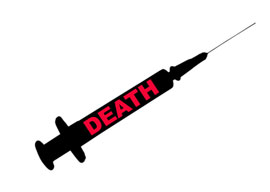
February 16, 2014

Source: Shutterstock
It is always within everyone’s power to die if he so wishes, provided that his autonomy is respected (patient autonomy being the philosopher’s stone of medical ethics) and treatment is not forced on him when he refuses it. All anyone has to do is to stop drinking or request that intravenous infusions be stopped, and in a few days, if his wishes are respected, he will be dead.
Perhaps it will be objected that death by dehydration is unpleasant. This is not so, or not necessarily so. With proper sedation, pain relief, and nursing, it is not very unpleasant; and, ex hypothesi, such discomfort as it results in must be minor by comparison with the suffering death is supposed to relieve. In other words, assisted suicide is unnecessary, provided that good end-of-life care is available”as it should be, irrespective of the possibility of assisted suicide.
As is often the way, the passion with which an issue is debated conceals something deeper at stake. In the absence of religious belief, of any assurance that life has a transcendent meaning beyond itself, man feels the need to be in control of everything. Control and power become the meaning of life. That is one of the reasons that paranoia”the feeling that everything that happens must be somebody’s fault, the search for someone to blame“does not decline with the supposed advance of reason. We want to feel that everything, good or bad, depends on us.
That is why the existential limit of life”death”seems an affront to him and must be brought under not merely technical, but bureaucratic control. The very procedure of euthanasia”the forms to fill in, the legal safeguards”gives us the comforting illusion that death is voluntary and that we are, or can be, infinitely Promethean. If I am right about the permanent possibility of ending our own lives by refusal to drink, then the demand for the right to assisted suicide is not so much about the reduction of suffering as the exercise of control, albeit illusory in the larger sense.
It is not only in the demand for euthanasia that we seek control for lack of any other purpose. Many”not, of course all”of the demands for “justice” are in reality cries of rage at the unfairness of existence. This unfairness, built into the nature of existence itself, is something that we have to learn to accept if we are to have tolerable sublunary lives. I”m not sure I”ve learned to do it myself.